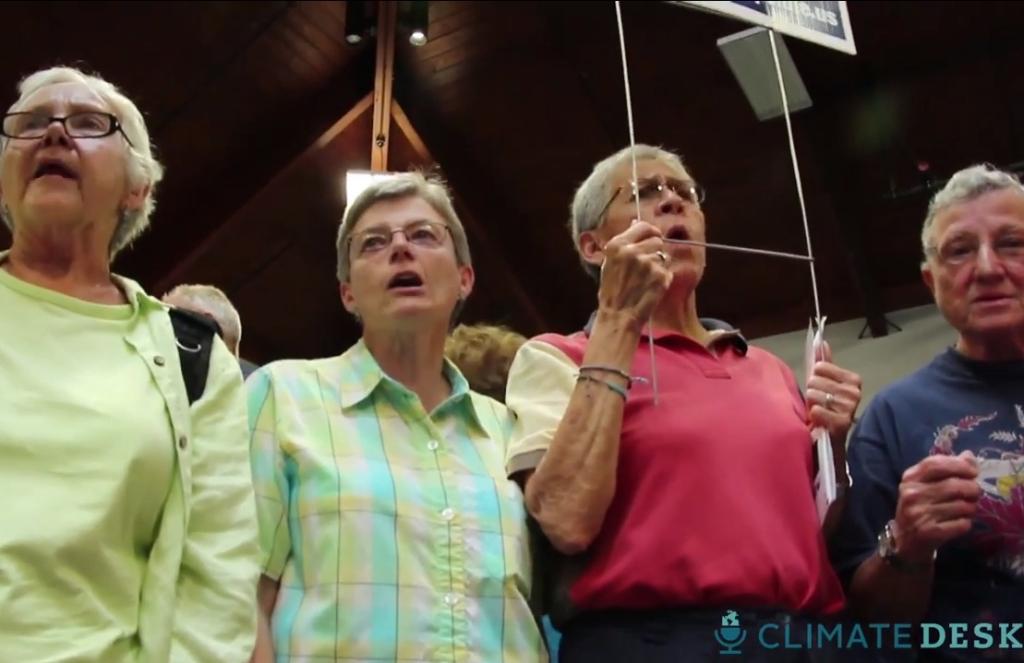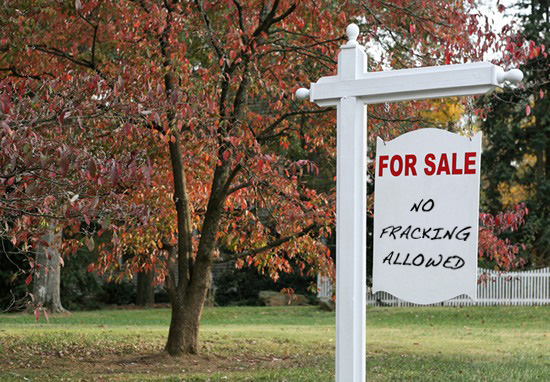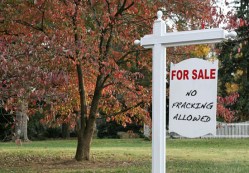When it comes to the real estate market in Bradford County, Pa., where 62,600 residents live above the Marcellus Shale, nothing is black and white, says Bob Benjamin, a local broker and certified appraiser. There aren’t exactly “fifty shades of grey,” he says, but residential mortgage lending here is an especially murky situation.
When Benjamin fills out an appraisal for a lender, he has to note if there is a fracked well or an impoundment lake on or near the property. “I’m having to explain a lot of things when I give the appraisal to the lender,” he says. “They are asking questions about the well quite often.”
And national lenders are becoming more cautious about underwriting mortgages for properties near fracking, even ones they would have routinely financed in the past, Benjamin says.
That’s a real problem in Bradford County, where 93 percent of the acreage is now under lease to a gas company.
Local banks are still lending because they have to if they want the business in the county, according to Benjamin, who has been involved in the area’s real estate market since 1980. But, he says, “The big boys, Wells Fargo and the other banks are probably pretty similar, they are going to protect their butt.”
Lawyers, realtors, public officials, and environmental advocates from Pennsylvania to Arkansas to Colorado are noticing that banks and federal agencies are revisiting their lending policies to account for the potential impact of drilling on property values, and in some cases are refusing to finance property with or even just near drilling activity.
Real estate experts say another problematic trend is that many homeowners insurance policies do not cover residential properties with a gas lease or gas well, yet all mortgage companies require homeowners insurance from their borrowers.
“Well, that is a conflict,” says Greg May, vice president of residential mortgage lending at Ithaca, N.Y.-based Tompkins Trust Company.
Last month, a landowner in Madison, N.Y., was surprised when their insurance company refused to renew their homeowners policy because there is a conventional gas well on their property.
While the media and environmental groups have focused on shale drilling’s potential to poison the soil, water, and air, they’ve largely overlooked its potential to poison the real estate market.
“I think we are on the tip of this,” says Steve Hvozdovich, Marcellus Shale coordinator for Clean Water Action in Pennsylvania. “Whether you are the homeowner trying to get homeowners insurance or the neighbor [to a fracking site] who is trying to refinance, there are just so many tentacles to this. I don’t think people are grasping all the impacts of natural gas drilling.”
Benjamin doesn’t often hear property owners talk about the issue. “I don’t think most are concerned about it,” he says. “But I think they may have to be in the future.”
The first denial
Brian and Amy Smith live across the street from a new gas well in Daisytown in Washington County, Pa., an hour south of Pittsburgh. Last year, when they applied for a new mortgage on their $230,000 home and hobby farm, they were denied.
According to ABC affiliate WTAE, this appears to be the first example in western Pennsylvania of a homeowner being denied a mortgage because of gas drilling on a neighbor’s property:
In an email, Quicken Loans told the Smiths, “Unfortunately, we are unable to move forward with this loan. It is located across the street from a gas drilling site.” Two other national lenders also turned down Brian Smith’s application.
“I think a lot of folks nationally are watching this case,” says Rep. Jared Polis (D-Colo.), a congressman who represents areas north and west of Denver. He noted that in his home district fracking leads to a “haircut on a property’s values.”
“I think it is something that the banks would frankly be smart to look at,” Polis says.
Elisabeth N. Radow, a lawyer and chair of the League of Women Voters of New York State’s Committee on Energy, Agriculture and the Environment, says the Smiths’ story shows that property owners are clearly vulnerable to what happens on their neighbors’ land in fracking territory. “A [fracking] gas well brings commercial activity, can pollute drinking water and devalue the property.”
Radow says it’s logical that high-volume horizontal fracturing — an operation in which millions of gallons of water mixed with hundreds of chemicals are pumped horizontally into layers of shale — has lenders worried. “They are trying to protect themselves,” she says.
The Obama administration has so far taken a hands-off approach to regulating fracking, as have many states, so the banks are trying to figure out how to proceed in uncertain territory.
“What is the federal government doing to protect the Smiths of the world?” asks John R. Nolon, a land-use and property professor at Pace Law School. “Banks are out there on the frontier of this regulatory chaos saying, ‘We can’t assure ourselves this is a safe technology because there is this fragmented regulatory process.’”
A very clear stance
Radow advises people looking to purchase a home anywhere with drilling to do their homework before buying.
She predicts that homeowners will start seeing mortgage provisions prohibiting gas drilling. She saw one earlier this month from New Jersey, where the gas industry is lobbying Gov. Chris Christie (R) to open the Delaware River basin to fracking. The “Mineral, Oil and Gas Rights Rider” [PDF] on loan paperwork from Sovereign Bank says the mortgage will be automatically recalled if the property owner transfers any oil or gas rights or allows any surface drilling activity. It also specifies that owners must “take affirmative steps to prevent the renewal or expansion” of a current gas lease.
A spokesperson for Sovereign Bank said the company would not comment for this story.
May, the lending firm vice president from Ithaca, says he is neither pro- nor anti-fracking, but he thinks property owners and prospective buyers need to be aware of these kinds of mortgage issues.
“That is one of the top lenders that has taken a very clear stance,” May says of the Sovereign Bank document. “We need to pay attention to this.”
Another big unknown is how homeowners might be affected by horizontal drilling happening underneath their property, May said. “Horizontal drill bores radiate out from the vertical bore up to one mile in each direction, which could potentially impact other owners’ fee-simple real estate ownership,” May says.
The problems are here
Twelve hundred miles southwest of Bradford County, Connee Robertson and her husband run an animal rescue center on 1.6 acres overlooking Little Red River in Heber Springs, Ark..
Robertson moved to the area in 1993 because she fell in love with this part of the Ozarks known for its pristine rivers and lakes. That was before gas companies such as Chesapeake Energy discovered the Fayetteville shale formation in the early 2000s.
Once that happened, the majority of property owners in Heber Springs leased their gas rights. “Everyone saw dollar signs,” Robertson says. “Everyone ends up regretting it. The problems are here now.”
Over the past few years, those problems have included earthquakes and drilling crews pulling water out of the Little Red River. One of Robertson’s horses died for unknown reasons, and her neighbors’ wells have been polluted.
More recently, Robertson has heard about buyers unable to purchase homes in the area because they can’t secure financing.
In the Laurel Highlands area of Pennsylvania’s Allegheny Mountains, traditionally known for tourism and recreation, drilling is scaring off prospective second-home buyers before they even start thinking about mortgages, says Melissa Troutman of the Mountain Watershed Association. She knows of one buyer who left the market after they learned that there was drilling three and a half miles from a home they were looking at.
In technical default
Many of the largest mortgage institutions have already enacted policies that bar lending to certain properties near gas drilling and gas lines.
The Federal Housing Administration’s lending guidelines prohibit financing for homes within 300 feet of a property with “an active or planned drilling site.” In an email response to a question from Grist, FHA spokesman Lemar Wooley explained the reasoning behind the guidelines:
FHA is primarily concerned with the health and safety of the occupants of the dwelling. If the property is subject to smoke, fumes, offensive noise and odors, etc. to the extent they would endanger the health of the occupants then the property is ineligible. FHA is also concerned with the risk to the insurance fund. So if the property is subject to those same items and the health of the occupants is not endangered, but the marketability of the property is compromised, the property may not be eligible for FHA insurance.
Fannie Mae and Freddie Mac also prohibit property owners from signing a gas lease.
May said many owners are now in “technical default” under the terms of their mortgage if they signed a gas lease without first getting consent from their lender.
Another clause in Fannie Mae and Freddie Mac mortgages prohibits hazardous materials on a residential property. “It comes as a surprise to a lot of people. They weren’t aware that their mortgage came with those restrictions,” May said.
Back in Bradford County, Benjamin, who plans to retire in 10 or so years, hasn’t decided whether he wants to keep his family in the area, where there are “good and bad points” to the drilling boom. But he knows one thing for sure: Fracking “changed everything” in the region’s real estate market.




